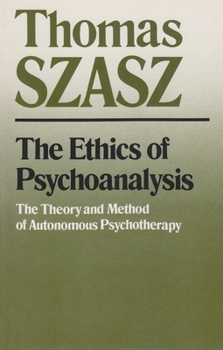The Ethics of Psychoanalysis: The Theory and Method of Autonomous Psychotherapy
Select Format
Select Condition 
Book Overview
In the Ethics of Psychoanalysis, Thomas Szasz describes psychotherapy as a social action, not as healing. Conceived in this way, psychoanalytic treatment is characterized by its aim--to increase the patient's knowledge of themself and others and hence freedom of choice in the conduct of their life; by its method--the analysis of communications, rules, and games; and lastly, by its social context--a contractual, rather than a therapeutic, relationship between analyst and the one being analyzed. The Ethics of Psychoanalysis remains one of the most concise, precise, and lucid expositions of the nature, possibilities, and limitation of psychoanalytic treatment to be found anywhere.
Format:Paperback
Language:English
ISBN:0815602294
ISBN13:9780815602293
Release Date:December 1988
Publisher:Syracuse University Press
Length:248 Pages
Weight:0.65 lbs.
Dimensions:0.7" x 5.3" x 8.2"
Customer Reviews
2 ratings
An eternally relevant work of genius, which should be in all University libraries.
Published by Thriftbooks.com User , 19 years ago
Thomas Szasz should have been awarded the Nobel Prize for this original brilliance , illuminating the mysterious process of Psychotherapy. As a medical practitioner myself, having attended a lecture by Thomas Szasz as a student, I have often read his articles, marvelling at his command of literature, as well as his insight into the human mind. Until I read this book, which I discovered recently, I have been in the dark. I believe this book should be read by all "mental health " practitioners, students, and "so -called patients ", before involving oneself or anyone one knows in any kind of "therapy."
Psychiatry: How It Should Be Practiced
Published by Thriftbooks.com User , 20 years ago
I always found writings and ideas of Dr. Thomas Szasz fascinating, and I have read most of his books. Almost all of them include a disclaimer by the author: differently phrased but always firm statements that the kind of psychiatry Dr. Szasz practices has nothing to do with the conventional coercive psychiatry. I often wondered what kind of psychiatry Dr. Szasz does practice, and if there is a way to practice psychiatry at all if you accept Dr. Szasz basic ideas (these ideas, of course, are not exclusively his, he just has enough courage to be the staunchest defender of the common sense among psychiatrists). There is nothing in the book about the specifics of Dr. Szasz' psychoanalytic methods. This book is dedicated strictly to the ethical aspects of the relationship between the analyst and the patient. Dr. Szasz describes in great detail his views on the nature of the relationship between the patient and analyst, the fundamental ethical principles underlying this relationship, and the developmental stages of the relationship from the ethical perspective. After reading "Ethics of Psychoanalysis" I can tell you that, yes, Dr. Szasz does what he preaches, and, yes, it is possible to practice psychiatry in a non-coercive way. A word of caution: In order to understand this book, it helps to be familiar with the basic psychological ideas advanced by Dr. Szasz throughout his long career. His "The Myth of Mental Illness" is a good place to start.





